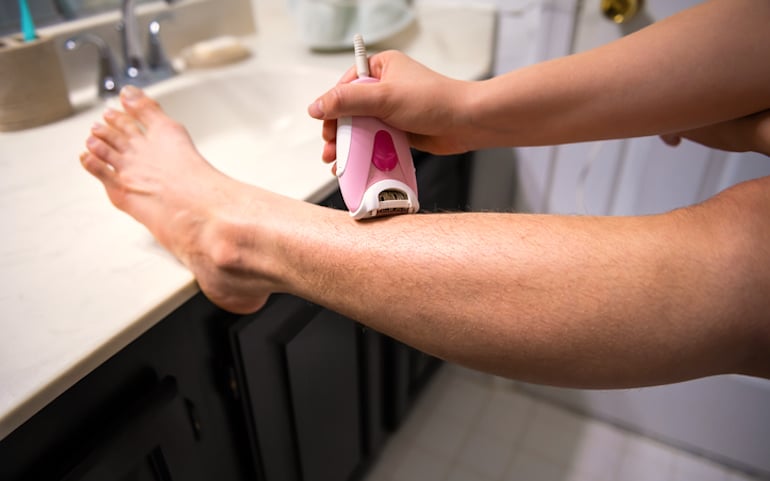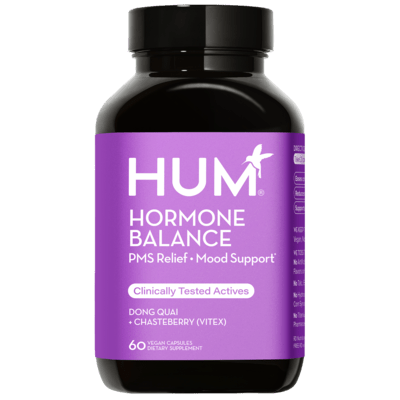Think something’s up with your hormones? Learn how to identify symptoms of hormonal imbalance and understand their causes.
The word “hormones” may elicit memories of high school health class, in which a visibly uncomfortable teacher cringed through a lesson about puberty while fellow students tried—and usually failed—to keep straight faces.
Whether your teacher was less than enthusiastic about the topic or these lessons took place too long ago to recall, you may be a bit foggy on the details of hormonal health as an adult.
For that reason, let’s start with a quick refresher on the basics. Then, we’ll delve into how to know if you may have a hormonal imbalance yourself.





What are hormones?
Hormones are fascinatingly complex substances that allow our bodies to function properly. They’re “messenger” chemicals that glands (think: adrenal, pituitary, and thyroid) secrete into the bloodstream. This complex system of glands and hormones is also known as the endocrine system. It essentially it tells our bodies what to do, how to do it, and when to do it to keep us alive. It’s important to understand that the human body creates much more than just sex hormones, such as estrogen and testosterone. In fact, there are dozens of hormones that our bodies produce on a regular basis that influence bodily functions, including:- respiration
- metabolism
- reproduction
- sensory perception
- movement
- sexual development and libido
- growth
Major Hormones + Functions
“There are many textbooks that just cover hormones and hormone imbalances,” says Lynn Westphal, MD, FACOG, a reproductive endocrinologist at Kindbody. The vast literature indicates how complex hormones truly are. For a quick guide, here’s a brief overview of some of the main players in the human endocrine system and their primary functions.- adrenaline: a crucial part of the body’s fight-or-flight response
- cortisol: helps control blood sugar levels, regulate metabolism, reduce inflammation, and assist with memory formulation
- estrogen: influences female physical features and reproduction (men have it too, but in smaller amounts)
- insulin: allows cells in muscles, fat, and liver to absorb glucose in the blood, which serves as energy for these cells
- luteinizing hormone (LH): controls the function of ovaries in females and testes in males
- melatonin: signals relaxation and lowers body temperature to aid sleep
- oxytocin: plays a crucial role in childbirth and assists male reproduction
- progesterone: prepares the endometrium for pregnancy potential after ovulation
- testosterone: controls male physical features (women have it too, but in smaller amounts)
- thyroid hormones: regulates weight, energy levels, internal temperature, skin health, and the growth of hair and nails

What is hormonal imbalance?
An easy way to understand hormonal imbalance is to think of an assembly line. The assembly line works at a good pace when hormones are balanced. This means that the endocrine system is functioning normally and our bodies are properly digesting, sleeping, storing fat, and more. But when hormones are imbalanced, it means the endocrine system is in a state of confusion. It either tells the body to produce more or less of certain hormones. So, that assembly line has now either sped up to the point that things are starting to fly off the rails, or it has slowed down to a sluggish crawl. Either way, the assembly workers (hormones) are unable to work properly—and disarray (imbalance) can ensue.Causes of Hormonal Imbalance
Because the endocrine system is made up of different glands, organs, and hormones, there are many reasons why hormones become imbalanced. While the causes are numerous, here are a few of the most common ones:- aging (menopause in women and andropause in men)
- chronic health conditions
- stress
- environmental endocrine-disrupting chemicals (EDCs)
- genetics
How do i know if I have a hormonal imbalance?
Dr. Westphal says that there’s a long list of symptoms related to hormone imbalance. For brevity’s sake, we’ll take a look at six of the most common symptoms, which may help you detect if you have a hormonal imbalance.
1. Acne
When it comes to acne, it’s very much like a canary in a coal mine. That is, flare-ups indicate that your skin is trying to tell you something. Sometimes the message is a temporary red flag, signaling that your body didn’t react well to a new cream, medication, or food. But in other situations—particularly when acne is persistent—it could be a symptom of hormone imbalance. According to the American Academy of Dermatology, women are more likely than men to develop acne as adults. In 20 to 40 percent of these cases, they never even developed acne as teenagers. That said, medical experts still don’t fully understand what causes acne, but they’ve started to make connections between acne and specific hormones. Testosterone, for example, is known to stimulate sebum (oil) production. If the body overproduces testosterone, excess sebum can clog pores and contribute to acne. Also, the primary stress hormone, cortisol, can also trigger testosterone production. That said, if you’re chronically stressed out, breakouts can potentially result.2. Hair Loss
Both women and men can experience hair loss due to hormonal imbalance. But let’s clarify something first: Hair naturally falls out and grows back. In fact, according to the Mayo Clinic, men and women lose about 50 to 100 hairs a day. However, it’s cause for concern if the hair doesn’t grow back. One common form of hair loss is androgenetic alopecia. A 2020 Harvard Medical School article explains that this condition is “likely related to increased androgen activity.” It then details two things that occur when people experience hair loss:- It takes longer for new hair to grow back after it falls out.
- The hair follicle becomes smaller and makes thinner, shorter hair.

3. Excess Hair Growth
We all have body hair of some sort, and it actually serves an important purpose: It protects our skin. Women’s body hair is generally paler and finer than men’s body hair. But when women experience excessive body hair growth that’s typically thick and dark, it results in a condition called hirsutism. Hirsutism usually follows a “male pattern” of hair growth. It can appear above the upper lip, around the areola, or on the lower abdomen, back, upper arms, pubic region, and inner thighs. Researchers at Monash University think these body parts are affected more than others because they’re more sensitive to androgens. And yes: The same hormones that are linked to acne and hair loss are also connected to excessive hair growth in women. Androgens stimulate hair follicles which, in turn, trigger hair growth. So if the body overproduces androgens, the hair follicles may create body hair that’s thicker, darker, and longer than normal. Note: If you’ve always had thick, dark body hair, then this may not be a sign of hormone imbalance. The Monash researchers connected body hair growth to hormone imbalance specifically on account of a recent change in hair growth.4. Fatigue
Sure, there are many reasons why we may feel exhausted. However, constant fatigue can be a symptom of hormone imbalance in both men and women. When chronic fatigue is related to hormone imbalance, it’s usually due to hypothyroidism, in which the thyroid gland is underactive. According to the National Institute of Diabetes and Digestive and Kidney Diseases, approximately 4.6 percent of people in the US over the age of 12 have an underactive thyroid. As we saw above, the thyroid plays an important role in managing the way our bodies use energy. When it’s underactive, it doesn’t produce the necessary hormones to function at regular levels. As a result, a dip in thyroid hormones can lead you to become more tired and lethargic.
5. Low Libido
In 2016, the University of Utah’s health department reported that 20 to 25 percent of men and 40 percent of women experience bouts of a lack of interest in sex. Not being in the mood from time to time is both common and normal. However, a low libido is more than just a temporary disinterest in sex, and hormonal imbalance may factor in if the change is sudden and persistent. A common cause of low libido in both men and women is a decrease in the production of androgens (and testosterone in particular). For women, lower production of estrogen can also weaken sex drive. Further, low libido is also linked to aging due to hormonal changes that naturally occur later in life.6. Irregular Menstruation
Aside from hirsutism, another significant symptom of hormone imbalance in women is irregular menstruation. A normal menstrual cycle lasts about 21 to 35 days. However, when hormones are out of balance, menstruation may occur only once every few months, indicating that the ovaries aren’t releasing eggs. Polycystic ovary syndrome (PCOS) is one of the most common conditions contributing to irregular menstruation. In fact, it’s the most common hormonal reproductive condition in women, affecting 10 percent of women in the US. When it comes to PCOS, an overproduction of testosterone or a lack of estrogen and progesterone disallows the ovaries to release an egg. Without this release, the ovulatory phase of the menstrual cycle can’t be trigged—and without it, the menstrual cycle elongates. While PCOS may seem menacing, treatment plans from an endocrinologist, gynecologist, and/or dietitian can help abate this condition.How to Address Hormonal Imbalance
The good news is that treating hormonal imbalance is both possible and in many cases, simple enough. If the case isn’t too severe, Dr. Westphal says medical professionals “can usually treat symptoms easily.” The earlier you identify a hormonal imbalance, the better you can remedy it. However, you can improve your symptoms even in the case of long-term issues. Here’s how to start.Identify the Causes
Of course, this first step is crucial. It’ll likely require a blood or saliva test, which can show granular details about your hormone levels. Once you have a clearer picture of the hormones that are acting abnormally, you can start to remedy them.
Boost Hormonal Health Through Diet
In many cases, changing your diet can significantly improve hormone levels. That’s because hormonal health is inextricably linked to nutrition. For example, soy-rich foods like edamame and tofu can affect your body’s production of estrogen. If you’re looking to address a hormonal imbalance without medical intervention, working with a dietitian may be a good place to start. In the meantime, you can also consult this list of the best foods that help balance hormones.Consult Your Doctor
Lastly, if the steps above still don’t yield positive results, you may require further assistance as guided by your doctor. Fortunately, Dr. Westphal says that more intensive treatments can make your condition easier to manage.More like this









